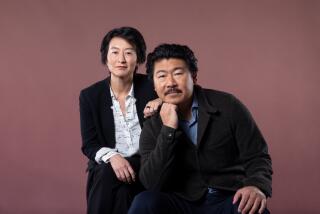Tyson Foods exec spreads wings in China
SHANGHAI — When James Rice first arrived in southern China in 1987, locals flocked to get a closer look at the 6-foot-1, 185-pound Californian with brown hair and hazel eyes. Most people in remote Yunnan province had never seen a white man before, so when they caught up with him as he glided on “speedy shoes,” as they called his rollerblades, some would pinch his skin or touch his long legs.
Twenty years later, 20 pounds heavier and white streaks over his brush-cut hair, Rice still draws a crowd in China.
In the spring, camera crews followed him as he steered his 1952 green-and-gold Rolls-Royce from Hong Kong to the Great Wall in Beijing, along with a clutch of other classic car hobbyists. More recently, Rice was making the rounds at a large poultry market in Suzhou, the ancient silk city near Shanghai, when people began to cluster around the man who is pictured on a billboard high above the entrance of the market. Save for the Rolex watch and Ray-Ban sunglasses, the 42-year-old looked the same as in the billboard, with neatly pressed khaki shirt and matching pants -- the uniform worn by all employees of Tyson Foods Inc.
“China’s been good to me,” says Rice, who came to China with $100 in his pocket and now runs Tyson’s rapidly growing business in this nation.
Tyson exports about $200 million of chicken to China annually and is expanding its Chinese operations. Every month, 400 containers from Tyson’s plants in the U.S. dock at China’s ports, most of them filled with frozen chicken feet -- about 600,000 per container -- and other poultry parts such as wingtips that are throwaway items in the U.S.
“What Americans don’t eat, the Chinese love,” and vice versa, Rice says. “Chicken breast here is pet food.”
For all the booming growth and opportunities -- U.S. chicken exports to China are expected to double to $1 billion in 2012 -- this has been a tough year to be in the food business here. Food safety problems have roiled Sino-American relations since pet food ingredients from China killed and sickened thousands of dogs and cats in the United States, sometimes putting people like Rice in the cross hairs.
More than a dozen containers of pig hearts and ears, chicken paws and gizzards from American food companies including Tyson were blocked this summer at Chinese ports in what some believe was retaliation after U.S. regulators restricted imports of Chinese shrimp, catfish and other foods.
But the crisis and political challenges may have presented the perfect opportunity for Rice to gear up for what his friends see as his future calling: diplomat. As a senior executive of the world’s largest meat company and member of the board of governors of the American Chamber of Commerce in Shanghai, Rice has been a voice for calm and reason in opinion pieces he’s written for the Asian Wall Street Journal. He has brokered meetings between top Chinese officials and reporters and has had some success goading political leaders in Beijing and Washington to open their doors to each other.
In October, Rice testified at a congressional subcommittee hearing on food safety and security. “I was the only one who had anything nice to say about China,” he says. Asked about his political ambitions, the former president of UCLA’s Young Republicans club doesn’t demur: “I’d like to be ambassador to China.”
Rice speaks fluent Mandarin and moves easily between China and California, where he returns every few weeks. He loves bone-in rib-eye steak as well as peppery Sichuan dishes, courtesy of his wife, May, a native of Chongqing. He’s a member of the predominantly black West Angeles Church of God in Christ on Crenshaw Boulevard, and he grows his left-hand pinky fingernail long, like the aristocracy in the Qing Dynasty.
A $300-an-hour executive coach from Orange County helps Rice to be a better team leader and balance his introvert tendencies with the need to be assertive.
As a manager in China, “you have to deal more indirectly,” says Thomas Needham, president of Global Executive Resources. “But it’s easy to go too far in that.” Needham, who splits his time between Shanghai and Newport Beach, says Rice is learning to be more direct as he develops his local staff. “This is a market where you have to learn to be tough.”
Rice was born in Newport Beach, grew up in Costa Mesa and went to UCLA, majoring in political science. In the summer of his junior year in 1987, he was among the first group of exchange students from UCLA to China. After graduation, he took a job as a bank officer for Wells Fargo in Westwood, making $22,000 a year. Two years later, he accepted an invitation from Kunming University to work as an English teacher.
Rice says he knew only three Chinese words when he got there: hello, goodbye and too expensive. “I came here because beer was cheaper than water,” he says with a hearty laugh. A year later, he married May; his Chinese rapidly improved.
Rice now lives in a four-bedroom company rental on Shanghai’s far west side with his wife and their two children, but he’s building a 4,800-square-foot Spanish-style home on a hill in Bel-Air, a few doors down from pop star Nick Lachey. Parked in the garage are his Rolls-Royce and a 2005 Bentley Arnage. (In March, he spent $4,000 to have his Rolls shipped to China for the 12-day Hong Kong-Beijing Classic Car Rally.)
Rice says he made money investing in California real estate. He also socks away half of his salary, just like many Chinese.
“When I got to know him, I felt he was a Chinese who happened to look American,” says Weng Yujie, general manager of Lianhua Supermarket Holdings, a convenience-food chain in Shanghai. Weng first met him about six years ago when Rice was running the China business for Danone, the French food giant. “He showed great respect to us and to the Chinese company’s different sales mode,” Weng says.
Before Danone, Rice worked with Kimberly-Clark for eight years, moving his way up from translator all the way to general manager in Hong Kong. Overseeing the region’s manufacturing of Kleenex tissues and Huggies diapers, Rice traveled throughout China, learning firsthand the country’s fast, flexible and cheap manufacturing capabilities.
“When he decided to go to China, we all thought he was crazy,” said Andrew Riabokin, Rice’s roommate at Delta Tau Delta fraternity who is now director of CFour Partners Worldwide, an executive search firm based in Santa Monica. “He’s really turned into a global businessman.”
--
More to Read
Inside the business of entertainment
The Wide Shot brings you news, analysis and insights on everything from streaming wars to production — and what it all means for the future.
You may occasionally receive promotional content from the Los Angeles Times.











